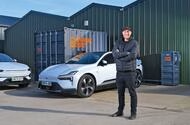Fellten, an innovative electric vehicle (EV) technology company based in Yate, near Bristol, has made quite a name for itself by merging creativity with sustainability. Initially known for crafting unique electric vehicles, including Batmobiles, the company has recently pivoted towards a groundbreaking project: the Charge Qube. This portable charging solution is designed to address the pressing need for accessible EV charging infrastructure, especially in areas where traditional grid connections are impractical or too costly.
What’s the Charge Qube All About?
Imagine a 10-foot ISO-certified steel container, capable of housing up to eight second-life car batteries, providing a total of 450kWh of power. That’s the essence of the Charge Qube. It’s not just a charging station; it’s a flexible energy solution that can be transported easily on the back of a truck, making it ideal for various locations—from urban centers to remote areas. The idea is to offer affordable charging options for electric vehicles, particularly when full grid connections are either difficult or impossible to establish.
Chris Hazell, one of the co-founders of Fellten, emphasizes that the Charge Qube represents a shift in the company’s mission. While their previous projects were driven by a passion for cars, this new venture is rooted in addressing a critical environmental challenge: the need for cleaner energy solutions. By repurposing batteries from electric vehicles that have reached the end of their first life, Fellten is not only promoting sustainability but also creating a viable business model.
How Did Fellten Get Here?
Fellten’s journey began in 2018 under the name Zero EV. Hazell, a former petrolhead, transitioned to electric vehicles after realizing that the limits of combustion engines had been reached. His background in large-scale power management, including overseeing power systems for major events like the London Olympics, equipped him with the skills necessary to innovate in the EV space.
The company initially gained traction by converting traditional vehicles into electric ones, including a Tesla-powered Volkswagen camper and a fleet of electric stunt cars for the film industry. Their unique approach—transparency about battery technology—set them apart from competitors who often kept their methods under wraps. This openness fostered trust and attracted a loyal customer base.
What’s Next for Fellten?
With the Charge Qube, Fellten is looking to the future. The company plans to expand its offerings, aiming to deploy a fleet of 3,000 to 4,000 charging hubs globally, potentially reaching markets in Africa and Australia. Each Qube can charge up to ten vehicles simultaneously, and future versions will offer rapid charging capabilities, making them even more versatile.
Hazell is particularly excited about the potential impact on commercial vehicles. He notes that while private cars sit idle for 97% of their lives, commercial vehicles are in constant use. The Charge Qube can help businesses transition to electric fleets by providing a reliable and efficient charging solution that can be powered by renewable energy sources.
Looking Ahead: Innovations and Challenges
Fellten is not stopping at the Charge Qube. Hazell envisions developing a 20-30kWh module that could be carried by vehicles needing a temporary range boost, as well as tackling the complex issue of battery recycling. While many believe lithium will remain a key component in batteries, Hazell suggests that the industry may shift away from lithium in the long run, raising questions about the future value of lithium batteries.
His commitment to sustainability is evident. The COVID-19 pandemic served as a wake-up call for him, highlighting the urgent need for environmentally friendly solutions. The Charge Qube is not just a business venture for Hazell; it’s a chance to contribute positively to the planet.
The big takeaway? The evolution of electric vehicles isn’t just about making them faster or more powerful; it’s about creating smarter, more sustainable solutions for our energy needs. By focusing on innovative projects like the Charge Qube, companies like Fellten are paving the way for a cleaner, greener future. If you’re curious about how you can contribute to this shift, consider exploring one small change in your own life this week—whether it’s reducing energy consumption or supporting sustainable businesses. You might just notice the difference by the end of the month.

